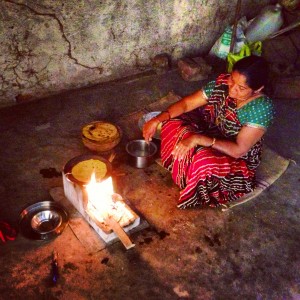I love cooking. Cooking is my personal way of dealing with stress and pressure. I can see how the ephemeral emotions that overwhelm me will go away as I mix ingredients and create something tasty out of nothing. But rather than cooking alone, I prefer preparing food with my friends and family. It makes the process even more exciting. You can feel a sense of belonging to the same process, and enjoy the interactive engagement over a steaming pot. In Gujarat my friend Omar and I had a wonderful opportunity to prepare food on an open fire in a Tribal village, guided by a women who is a community leader. And this process helped me discover another advantage of cooking together for your research. There is a lot of literature around the topic of conducting interviews on the ground, but there is not a lot of emphasis on the importance of shared activity in the process of interviewing. As soon as we sat around the fire and started kneading corn dough to make delicious bread, I asked the woman how she felt as a community leader; did she feel a sense of empowerment; did relations in her family change after she was elected? I was surprised to hear her response that it was her husband who told her to run, and he is responsible for the decisions she makes. I think that open atmosphere of cooking food together helped us build trusted relations between the interviewer and the interviewee and get honest and direct responses for our research. Apparently in this particular Tribe, the patriarchy has not gone with the election of a woman as a village representative.
Having said that, however, it was one particular village where we heard that the imbalance of power has not changed, and we cannot draw conclusions based on one episode. We visited another tribe in Zankhvav the same day and saw a shift in patriarchal structure. The village leader was not only the head of the household giving direction to her husband; the young woman was also fighting for the benefits of development for her village. In our research we have to be aware of both stories of women as leaders, that are challenging the patriarchy, and fighting for empowerment, and about stories of others that are oppressed and discriminated against. In our research we have to be aware of both stories.



